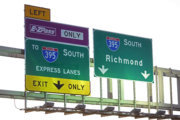Every car accident is at least a hassle and at most a tragedy. While many fender-benders and minor collisions can be resolved through your insurance company and a local mechanic, some accidents cause extensive damage and involve a more complicated insurance process.
If you’ve been told you have a totaled car after an accident, it means that the cost of repairs is too high compared to the value of the car. But how this is determined is based on several factors, including your state’s laws. Here’s an overview of the process to help you understand how to know if your car is totaled.
[READ: How to Report a Traffic Accident to the Police]
How a Total Loss on Vehicle Is Determined
If you were just involved in a car accident, you’re probably asking yourself, “How do I know if my car is totaled?” Unless your car is wrecked to an extreme degree, you won’t have an immediate answer.
After an accident and before any repair work is done, you’ll need to file an insurance claim. The insurance adjuster assigned to your claim will initiate an inspection and have you bring your car to a repair shop that will assess the damage caused by the accident and provide an estimate of the repair costs.
Based on the estimate, the insurance company then decides whether to repair the vehicle or pay the car’s pre-accident actual cash value, or ACV, instead. The ACV is based on factors such as:
— Make and model
— Mileage
— Vehicle options
— Accident history
— Wear and tear
— Improvements and upgrades
Calculating Total Loss for a Vehicle
The formula used to assess whether or not a car has been totaled depends on your state’s laws and the insurance company’s policies and methods for valuation. Each state has laws that dictate when a car is a total loss and must be registered under a salvage title, and insurance companies use these laws to inform their totaled car policies. The two main methods for evaluating a total loss are the simple fixed percentage formula
and the total loss formula.
Simple Fixed Percentage Formula. Under laws that use this formula, a car is considered a total loss if the repair cost exceeds a certain percentage of what the car was worth immediately before the crash. For example, under Nevada law, a car is totaled if the repair costs are equal to or greater than 65% of the fair market value of the car before the accident.
Total Loss Formula. Some states, like Washington, will find a total loss when the salvage value–what the car could have been sold for at a salvage yard–plus the cost of repairs is equal to or greater than the actual cash value.
It’s important to note that insurance companies typically set a lower threshold than what a state’s law requires for salvage titles. They do this to give themselves a buffer in case additional damage is discovered after the initial estimate.
For example, if a state’s law sets a threshold at 80% of the ACV, and an insurance company were to use the same percentage, it could find itself agreeing to make repairs on a repair estimate that’s 75% of the ACV. However, during the repairs, this could rise above 80% if more car accident damage is discovered. The result? The insurance company would have initiated repairs on a vehicle that must be declared totaled by law.
Because of this, what makes a car totaled isn’t always a straightforward calculation. Be sure to read through your insurance policy to see what threshold your insurance company uses.
Process After a Total Loss on Vehicle Determination
What happens when insurance totals your car will depend largely on the circumstances of the accident and your insurance coverage. If you disagree with the insurance company’s decision, communicate with them and provide information that bolsters your argument. For example, if you think your car is worth more than what they’re saying, make a counter argument using things like blue book values, evidence of upgrades, etc.
If you accept that your car was totaled, compensation will depend on who was at fault in the accident and what types of insurance coverage apply. If another driver caused the accident, their liability insurance should cover the actual cash value of your car. Otherwise, collision insurance applies to accidents with other cars or immovable objects, and comprehensive insurance covers things like flooding, severe weather and vandalism.
If you accept what the insurance company offers to pay you, you’ll work with them and your state’s motor vehicle department to transfer the title of your totaled car to the insurance company, cancel your registration and turn in your license plates. You can then use the insurance money to purchase a new car. If you disagree with their offer and negotiations aren’t working, it might be time to hire an experienced attorney to help with your case.
[READ: You Hit a Parked Car — Now What?]
Frequently Asked Questions About Totaled Cars
Even a simple fender-bender can get complicated fast, but when a car is totaled, a whole extra set of unknowns can arise. Here are some answers to frequently asked questions about cars when they’re totaled.
How Much Does Car Insurance Pay for a Totaled Car?
Insurance will pay the actual cash value of your car, minus any applicable deductible. The insurance company uses a variety of factors to determine the pre-accident value of your car, including make, model, year, wear and tear, accident history and upgrades. This calculation accounts for depreciation, or the decline in value over time, which began the moment you bought the car.
That’s why your property damage compensation after an accident won’t be the full amount you paid for your car–unless the crash happened as you drove off the sale lot–and it could be less than what it would have cost to repair it.
What Happens if Insurance Totals Your Car, but You Disagree with Their Assessment?
Many people object when their insurance company has deemed their car totaled. Insurance companies are incentivized to pay as little as possible after an accident, but they also need to act in good faith and consider all of the evidence when making their determination.
If you think they’re undervaluing your car, you can hire a private appraiser, in addition to providing your own evidence of your vehicle’s value, which can include things like vehicle upgrades. If these efforts fail, you can always talk to an experienced attorney about how to recover your losses through a civil lawsuit.
What Happens When Your Car Is Totaled, but Still Drivable?
Can you keep a car that’s been totaled instead of handing it over to the insurance company? The answer depends on your state’s salvage title laws. Whether you want to keep driving your car, try to repair it or sell it for parts, some states won’t allow it if the damage exceeds a certain threshold.
In states that do allow it, the insurance company would pay you the actual cash value minus the salvage value and any applicable deductible. However, be aware that if you keep the car and the damage exceeds state levels, you’ll need to register the car under a salvage title, which could make it difficult to sell or insure in the future.
What’s the Salvage Value of My Car?
The salvage value is the amount the insurance company thinks it could get by selling your car in its current state to a salvage yard. In order for a salvage yard to figure out what to pay for a totaled car, they’ll consider various factors, such as:
— Make and model: Some cars have parts that are in particularly high demand.
— Damage: The more damaged a car is, the less useful its parts will be.
— Year and mileage: Older and higher-mileage cars tend to be worth less.
— The market: Supply and demand will always play a role in valuations.
If you’re not happy with the insurance company’s numbers, you can ask a car accident lawyer for guidance.
Is a Rental Car Covered by Insurance?
If you’re without a vehicle because insurance deems your car totaled–meaning you’ll need a rental car while searching for a new car–you may be in luck. Many policies include rental car expenses for a certain amount of time, even before declaring your car a total loss. Ask the insurance company handling the claim if they’ll cover a rental.
Who Gets the Insurance Check When a Car Is Totaled?
If you financed or leased your car, you’ll need to know what to do when your car is totaled and you still owe money on the car loan. First, you need to keep making regular payments on the car, even while you work through the insurance process. Next, any compensation awarded for the totaled car will go to the lending company to pay off the debt. If there’s anything left over, the car’s registered owner will get the rest.
If the amount insurance pays isn’t enough to cover the balance on your car loan, the insurance check still goes to the lending company and you’re responsible for paying off the remaining debt. This is why many drivers add gap insurance to their policy since it helps cover that type of expense.
Someone Totaled My Car — Can I Sue?
You can file a civil lawsuit seeking compensation for damages against someone who totals or otherwise ruins your car, or causes you any injuries after an accident, which can include emotional distress or lost wages from work. However, it’s often possible and less time-consuming to resolve these matters through the insurance claims process, whenever possible. If you want legal help with the process or you decide to file a lawsuit, consider consulting with an attorney who can advise you on your next steps.
[Read: How Is Fault Determined in a Car Accident?]
Need Help Getting Compensated for Your Totaled Car?
It’s easy to get bogged down in the insurance process and determinations of fault and vehicle values after a car accident, let alone the time you need to physically recover. See how you can get help, and the compensation you deserve, by contacting an experienced attorney today.
[How Do Lawyers Bill Their Time?]
More from U.S. News
How to Assess Car Damage After an Accident: 5 Steps
What to Do After a Motor Vehicle Accident: Checklist
How Is Fault Determined in a Car Accident?
What Is a Totaled Car? Overview and FAQ originally appeared on usnews.com







